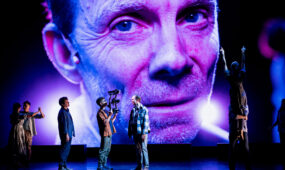Film Festival review: The Nightingale
Festivals
Australian writer and director Jennifer Kent has produced a brutal film that describes what a lawless, frightening place Van Diemen’s Land would have been in the early days of settlement.

Contrary to the notion that the English brought civilisation to Australia, The Nightingale, set in 1825 when Tasmania served as a penal colony, shows that it brought a lot of drunken soldiers and settlers who perpetrated violence on convicts, women and Aboriginal people.
Aisling Franciosi is outstanding as convict wife Clare, the sweet “Nightingale” who at the beginning of the film sings beautifully, and nervously, before a tavern of unruly soldiers.
When the smooth-talking, repulsive Lieutenant Hawkins (Sam Claflin) wreaks terrible violence on her family, Clare transforms into a determined angel of revenge, desperate to meet up with her attackers and punish them for their crimes.
As an Irish woman, she hates the British as much as the local Aboriginal people do, but she also has a superior white attitude and uses the demeaning term “boy” when she enlists the help of Aboriginal tracker Billy (played superbly by Baykal Ganambarr, who was named best young actor at the recent Venice Film Festival).
Gradually, however, Clare and Billy find a connection – a growing awareness and respect for each other and their respective cultures.
Kent – who also made acclaimed horror The Babadook, and who won the Special Jury Prize in Venice for this film – allows an audience to see the world through Clare and Billy’s eyes and not from the coloniser’s point of view.
Through the use of Gaelic and palawa kani (the Aboriginal language being revived by Tasmanian Aboriginal people), she has created a film that explores different cultures on many levels.
Billy’s name in palawa kani means “blackbird”, and the film shows his connection with these animals. The gentle tracker’s grief is palpable when he learns from other Aboriginal men who have been enslaved that he is the last of his people.
The Nightingale does not portray an idealised or romanticised version of Australia’s past; it is much more honest and truthful. Its violence – which had a strong effect on audiences at both the film’s world premiere in Venice and its Australian premiere at the Adelaide Film Festival on the weekend – is not like the thoughtless violence of video games and action movies, but rather shows the real impact of such acts on real people.

Get InReview in your inbox – free each Saturday. Local arts and culture – covered.
Thanks for signing up to the InReview newsletter.
Radek Ladczuk’s cinematography is also brilliant, revealing both the beauty and menace of the Tasmanian wilderness.
The Nightingale is a compelling piece of Australian cinema.
The Nightingale has no further screenings at the Adelaide Film Festival, but will have a general release across the country early next year. See more Adelaide Film Festival stories and reviews here.
Support local arts journalism
Your support will help us continue the important work of InReview in publishing free professional journalism that celebrates, interrogates and amplifies arts and culture in South Australia.
Donate Here





Comments
Show comments Hide comments